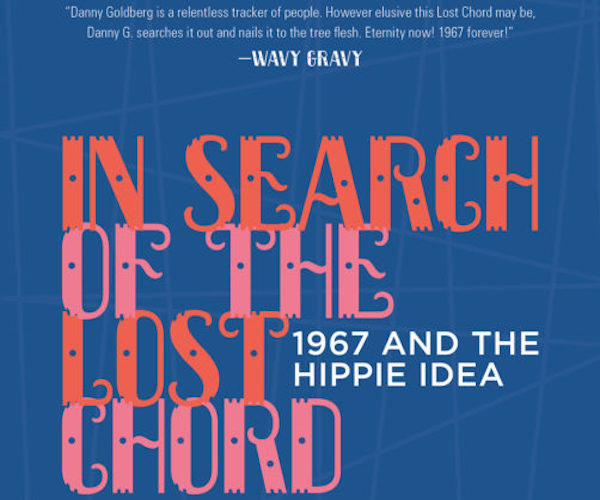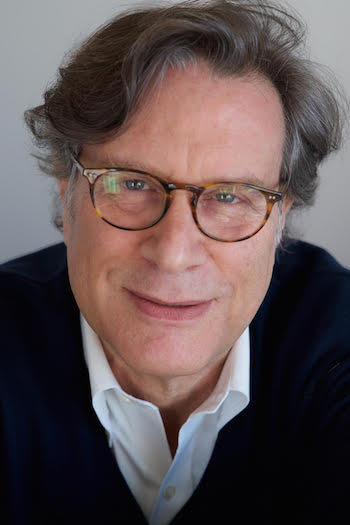Book Interview: Danny Goldberg on the Essence of Hippiness
“To me, ’67 was a year that was different from what came after it.”
In Search of the Lost Chord: 1967 and the Hippie Idea by Danny Goldberg. Akashic Books, 336 pp. $25.95 (available at a 25% discount on the publisher’s website)

By Blake Maddux
Danny Goldberg graduated in 1967 from New York City’s Fieldston High School, where his classmates included the soon-to-be famous and hugely influential musician Gil Scott-Heron.
A self-described “mediocre student,” Goldberg’s SAT scores got him into only two of the colleges to which he applied. He chose the University of California, Berkeley, because, in his words, “it just seemed cooler.”
Thus, Goldberg arrived at the epicenter of the so-called Summer of Love in August 1967, which was the tail end of the phenomenon’s existence.
Alas, he went from being a mediocre student to being one only in name at Berkeley.
“I literally went to only one week’s worth of classes,” Goldberg said. “As a teenager, I was really into LSD.”
The 17-year-old (he was born on the Fourth of July in 1950) returned to New York City in May 1968 and got a job at Billboard. It was modest start, to be sure, but his résumé would eventually include—but not be limited to—vice president of Led Zeppelin’s Swan Song Records, chairman of Warner Bros. Records, president of Atlantic Records, president of Gold Mountain Entertainment (whose clients included Nirvana, Sonic Youth, the Beastie Boys), and CEO of Air America Radio.
Since 2003, he has authored three books: How the Left Lost Teen Spirit, Bumping Into Geniuses: My Life Inside the Rock and Roll Business, and In Search of the Lost Chord: 1967 and the Hippie Idea, which Akashic Books published in June.
“What I mean by ‘the hippie idea’,” the author writes, “is the internal essence of the tribal feeling separate and apart from the external symbols which soon became overused, distorted, co-opted, and thus, understandably, satirized.”
Goldberg spoke to The Arts Fuse by phone from the New York City offices of Gold Village Entertainment, which he founded in 2007.
The Arts Fuse: Why did you title your book about 1967 after a Moody Blues album from 1968?
Danny Goldberg: Well, I needed a title. And originally I had a working title of It Was 50 Years Ago Today, which was kind of a riff on the Sgt. Pepper’s lyric “It was 20 years ago today.” And I found when I mentioned it to people younger than a certain age, they didn’t know what the reference was. So I just wanted another title, and I liked the idea of a song title or an album title because, you know, music is part of my life and part of what made the 60s what it was. And when I came across it, it kind of summarized my attitude about the book and I just liked the title. I think I have one sentence that’s about The Moody Blues in the book, but it’s not about The Moody Blues. It’s about the idea that the title suggests.
AF: What prompted you to write a book about 1967 in the first place?
DG: To me, ’67 was a year that was different from what came after it. There was a certain particular combination of—to extend the metaphor [of the title]—notes. The balance between spirituality, psychedelia, protest, and utopian thinking changed by ’68 with the assassinations and some other darker forces, so I thought it was a unique combination of energies that still inspires me, but the external symbols drained of meaning quickly and became the fodder for sitcom jokes. I was just trying to find what was the essence—through research, basically—at the time to try to recapture what the feeling was that I remembered from my teenage years.
AF: What was Berkeley like when you arrived there?

Danny Goldberg. Photo: Peter Cunningham.
DG: Haight-Ashbury was not…by the time I got there, it was dead. It was kind of gross. I went there once or twice. The thing I describe in the book is the deterioration of the Haight with the predators and the junkies and overrun with runaways … That was already the reality by the time I got there at the end of August. I think a year earlier, it was a very different place, so I missed that. But I kind of saw it. I saw what was kind of the carcass of it, but the essence of it was gone by the time I got there.
AF: You write in the Introduction, “I attended [University of California, Berkeley], briefly (very briefly), and by the end of 1968 had begun my career in the rock-and-roll business….” Could you expand on this?
DG: I literally went to only one week’s worth of classes. And I was pretty taken with drugs. I’m not boasting about it, it was kind of stupid, but that’s what I was into. I got there in late August and went through the first week’s worth of classes and was just kind of getting high for months and doing things I shouldn’t have been doing. By May [of 1968], I got in trouble out there and was back in New York and then got a job in the fall of ’68 as a clerk at Billboard and somehow stumbled into what I soon realized was the music business.
AF: What made the recently deceased Dick Gregory so important to 1967’s cultural climate?
DG: I think he was extremely important figure of the sixties. He was one of the first, I think the first African American comedian that appealed to white audiences. Bill Cosby came shortly after him. But Gregory came first and was more of an activist over the course of his life and became very close to Dr. King and was part of the anti-war movement and was kind of a key thought leader because he could travel between the entertainment world and the radical-political world in a way that very, very few people could.
AF: Do you think that Abbie Hoffman, a Worcester native who graduated from Brandeis, was an effective spokesperson for the hippie idea?
DG: I do. I think he was really somebody in the context of those times he was a major figure. … Abbie was able to travel between the hippie culture and the political radical culture in a way that very few could. He was an extremely sophisticated communicator. He understood things like what we now today call sound bites and kind of media events and was one of the great marketers of radical ideas that I have seen. … As a kid in high school, when he’d show up on a news show or on an interview show, he got my attention. He was funny, he didn’t seem preachy, he didn’t have that tedious rhythm that a lot of old-line Marxists had. He was able to kind of have a hipness to the way he would talk about the war in Vietnam or capitalism.
AF: To once again quote the introduction, you write, “At other moments I yearn to go back in time and warn my heroes that they are about to walk down a path they will regret.” What warnings would you give to whom?
DG: (laughing) I would tell Jimi Hendrix not to do whatever he did that killed him. And Janis Joplin. I would love to have them alive today.
Blake Maddux is a freelance journalist who also contributes to The Somerville Times, DigBoston, Lynn Happens, and various Wicked Local publications on the North Shore. In 2013, he received an MLA from Harvard Extension School, which awarded him the Dean’s Prize for Outstanding Thesis in Journalism. A native Ohioan, he moved to Boston in 2002 and currently lives with his wife in Salem, Massachusetts.
Tagged: Akashic Books, Danny Goldberg, Hippies, In Search of the Lost Chord: 1967 and the Hippie Idea
